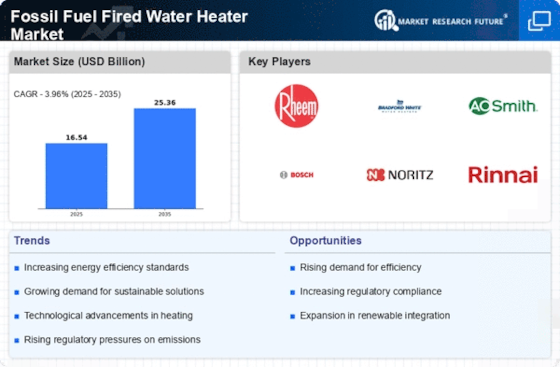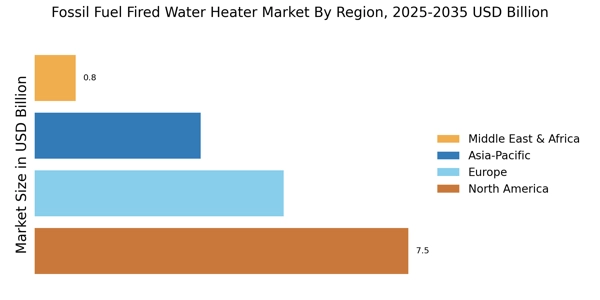Rising Energy Costs
The Fossil Fuel Fired Water Heater Market is significantly influenced by rising energy costs. As fossil fuel prices fluctuate, consumers are compelled to seek more efficient heating solutions to mitigate their energy expenses. This trend is particularly evident in regions where natural gas and oil prices have seen substantial increases. Consequently, consumers are more inclined to invest in high-efficiency fossil fuel fired water heaters that promise lower operational costs over time. Market data indicates that the demand for these units has surged by approximately 15% in the last year, as households and businesses aim to balance comfort with economic considerations. This growing awareness of energy costs is likely to continue shaping the Fossil Fuel Fired Water Heater Market.
Environmental Regulations
The Fossil Fuel Fired Water Heater Market is increasingly shaped by stringent environmental regulations. Governments are implementing policies aimed at reducing greenhouse gas emissions, which directly impacts the fossil fuel sector. These regulations often mandate higher efficiency standards for water heaters, pushing manufacturers to innovate and improve their products. For instance, recent legislation has set forth requirements that necessitate a reduction in NOx emissions from fossil fuel fired water heaters. This regulatory landscape compels manufacturers to invest in research and development, thereby enhancing the overall quality and efficiency of their offerings. As compliance becomes essential, the Fossil Fuel Fired Water Heater Market is likely to see a shift towards more environmentally friendly technologies.
Technological Advancements
The Fossil Fuel Fired Water Heater Market is experiencing a notable transformation due to technological advancements. Innovations in burner technology and heat exchanger designs are enhancing efficiency and reducing emissions. For instance, modern fossil fuel fired water heaters are now capable of achieving efficiency ratings exceeding 90%. This shift not only meets regulatory standards but also appeals to environmentally conscious consumers. Furthermore, the integration of smart technology allows for better energy management, which is becoming increasingly important in residential and commercial settings. As these technologies continue to evolve, they are likely to drive demand within the Fossil Fuel Fired Water Heater Market, as consumers seek more efficient and cost-effective solutions.
Increased Construction Activities
The Fossil Fuel Fired Water Heater Market is benefiting from increased construction activities across various sectors. As new residential and commercial buildings are erected, the demand for efficient heating solutions rises correspondingly. In many regions, fossil fuel fired water heaters are preferred due to their reliability and performance. Recent data suggests that the construction sector has expanded by 10%, leading to a corresponding increase in the installation of fossil fuel fired water heaters. This trend is particularly pronounced in developing areas where infrastructure development is a priority. As construction activities continue to flourish, the Fossil Fuel Fired Water Heater Market is poised for growth, driven by the need for effective heating solutions in new buildings.
Consumer Preference for Reliability
The Fossil Fuel Fired Water Heater Market is significantly influenced by consumer preference for reliability and performance. Many consumers view fossil fuel fired water heaters as dependable solutions for their heating needs, particularly in regions where electricity supply may be inconsistent. This perception drives demand, as consumers prioritize systems that can deliver consistent hot water without interruption. Market analysis indicates that approximately 60% of consumers prefer fossil fuel options over electric alternatives due to their perceived reliability. As this trend continues, manufacturers in the Fossil Fuel Fired Water Heater Market are likely to focus on enhancing the durability and performance of their products to meet consumer expectations.

















